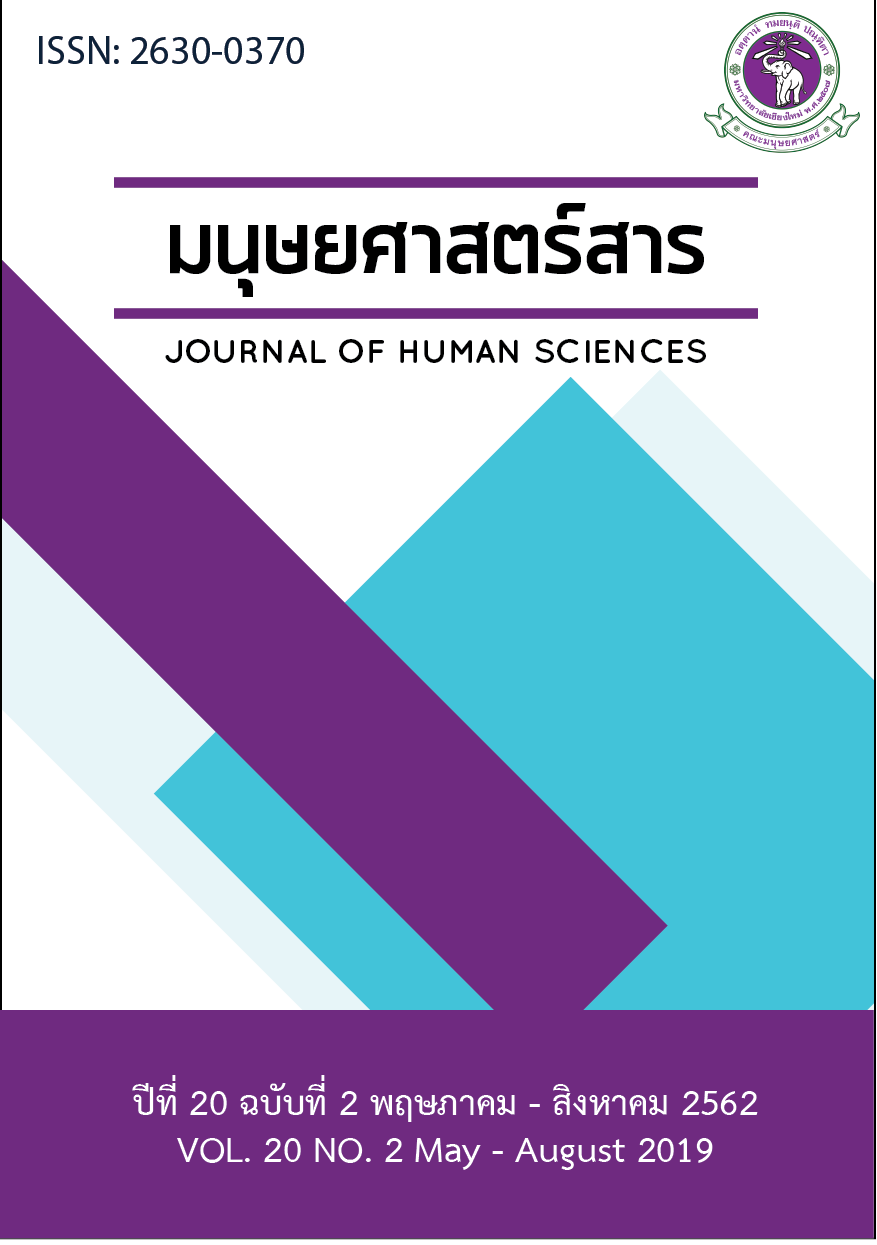การพัฒนาออนโทโลยีความรู้ด้านผ้าล้านนา
Main Article Content
บทคัดย่อ
การวิจัยเรื่องการพัฒนาออนโทโลยีความรู้ด้านผ้าล้านนามีวัตถุประสงค์เพื่อพัฒนาออนโทโลยีความรู้ด้านผ้าล้านนา โดยใช้วิธีการวิจัยเชิงคุณภาพ เก็บรวบรวมข้อมูลด้วยการวิเคราะห์เนื้อหาจากทรัพยากรสารสนเทศที่เกี่ยวข้องโดยใช้ทฤษฎีการจัดหมวดหมู่ ผลการวิจัยทำให้ได้ความรู้ด้านผ้าล้านนาที่นำมาจัดกลุ่ม จำนวน 10 กลุ่ม 1,256 คำศัพท์ กำหนดโครงสร้างความรู้ด้านผ้าล้านนาให้มีโครงสร้างตามลำดับชั้น จำนวน 8 หมวดความรู้ และกลุ่มความรู้พื้นฐานที่เกี่ยวข้อง จำนวน 3 หมวดความรู้ จำแนกเป็น 40 หมวดความรู้ย่อย 173 แนวคิด 728 คำศัพท์ การพัฒนาออนโทโลยีความรู้ด้านผ้าล้านนา ประกอบด้วย โดเมนความรู้หลัก คือผ้าล้านนา โดเมนความรู้ย่อย จำนวน 8 โดเมน ได้แก่ วัสดุใช้ในการทอผ้าล้านนา อุปกรณ์ที่ใช้ในการทอผ้าล้านนา วัตถุดิบที่ใช้ในการผลิตผ้าล้านนา กระบวนการผลิตผ้าล้านนา เทคนิคหรือรูปแบบการทอผ้าล้านนา ลวดลายผ้าล้านนา ประเภทผ้าล้านนา และ ผลิตภัณฑ์ผ้าล้านนา และกลุ่มความรู้พื้นฐานที่เกี่ยวข้อง จำนวน 3 โดเมน ได้แก่ พืช สัตว์ และ สี ออนโทโลยีความรู้ด้านผ้าล้านนา ประกอบด้วย คลาสหลัก จำนวน 42 คลาส คลาสย่อย จำนวน 131 คลาส ความสัมพันธ์ระหว่างคลาสตามลำดับชั้น มี 10 ชนิด จำนวน 205 รายการ คุณสมบัติ มี 9 ชนิด จำนวน 464 รายการ และข้อมูลตัวอย่างคลาส จำนวน 489 รายการ ผลการประเมินออนโทโลยีความรู้ด้านผ้าล้านนาโดยผู้เชี่ยวชาญ จำนวน 3 คน ประกอบด้วย ผู้เชี่ยวชาญด้านผ้าล้านนา จำนวน 2 คน และผู้เชี่ยวชาญด้านออนโทโลยี จำนวน 1 คน เพื่อตรวจสอบความถูกต้องของการจัดหมวดหมู่ของออนโทโลยี รวมทั้งตรวจสอบความสมบูรณ์ของโครงสร้างและความสัมพันธ์ภายในโครงสร้างออนโทโลยีความรู้ด้านผ้าล้านนาในภาพรวมมีความถูกต้อง ครอบคลุม และสัมพันธ์กับความรู้ด้านผ้าล้านนา
Article Details
เอกสารอ้างอิง
Brank, J., Grobelnik, M., & Mladenic, D. (2005). A survey of ontology evaluation techniques. In Proceedings of the Conference on Data Mining and Data Warehouse (SiKDD 2005). (pp.166-170). Ljubljana: Slovenia.
Browne, G. & Jermey, J. (2004). Website indexing: enhancing access to information within website. Retrieved from http://webindexing.biz/PDFs/WebsiteIndexing/WebsiteIndexing 2ndedition.pdf
Chiang Mai University, Cultural Arts Promotion Center. (1992). Fai Mai Thai Lanna. Chiang Mai: author.
Chowdhury, G. (2007). Organizing information: From the shelf to the Web. London: Facet.
Department of Cultural Promotion. (2017). Moradok Phoom Panya Thaang Wattanathum. Retrieved from http://ich.culture.go.th/
Ding Y. & Foo, S. (2002). Ontology research and development part 1-a review of ontology generation. Journal of Information Science, 28(2), 123-136.
Fine Arts Department. (2004). Pha Thor Phune Muang Phak Nuea (Lanna). Bangkok: Dookbea.
First Ontology. (n.d.). USA: Stanford University.
Gasevic D., Djuric D. & Devedzic V. (2006). Model driven architecture and ontology development. Germany: Springer-Verlag Berlin Heidelberg.
Gnoli, C. & Szostak, R. (2009). Beyond About-ness: Classifying Causal Links in the Service of Inter-disciplinarity. Retrieved from https://www.researchgate.net/publication/271247137_Beyond_Aboutness_Classifying_Causal_Links_in_the_Service_of_Interdisciplinarity
Gruber, T. R. (1995). Toward principles for the design of ontologies used for knowledge sharing. [Electronic version]. International Journal of Human-Computer Studies. 43(5-6), 907-928. Retrieved from http://www.sciencedirect.com/science/article/pii/S1071581985710816.
Guo, C. & Huang, D. (2009). Research on domain ontology based information retrieval model. Paper presented at the Intelligent Ubiquitous Computing and Education, 2009 International Symposium on.
Kruysawat, K. (2016). Karn Buranakarn Naew Kid Khong Padjekwitharn (Folksonomy) Nai Karn Saang Hua Ruang Sumrub Suppayakorn Sarasonted Nai Sakha Boriharm Thurakij Lae Setthasart [Integrating Folksonomy Concept in Building Subject Heading for Information Resources in the fields of Business Administration and Economics]
(Doctor of Philosophy Thesis Department of Information Studies, Khon Kaen University).
Leesuwan, W. (2007). Saranukrom Phaa Khruang Thug Thor. Bangkok: Ancientcity.
Leesuwan, W. (2016). Photjananukrom Phaa Lae Khruang Thug Thor (2nd ed.). Bangkok: Ancientcity.
Nantapichai, S. (2011). Krob Naew Kid Rabob Karn Jud Rabob Kwam Roo Daan Phaet Phaen Thai [Knowledge Organization System Framework for Thai Traditional. Medicine] (Doctor of Philosophy Thesis Department of Information Studies, Khon Kaen University).
National Research Council of Thailand. (2012). Yutthasart Karn Wijai 2012-2016: Phark Nue. Retrieved from http://www1nrct.go.th/downloads/ps/55/08/strategy8/02_n.pdf.
Noy, N.F. & McGuinness, D. L., (2001). Ontology Development 101: A Guide to Creating Your First Ontology. Retrieved from https://protege.stanford.edu/publications/ontology_development/ontology101.pdf
Panommit, P., Arayaphan, W., & Julrode, P. (2017) “Karn Khon Khune Lae Khao Thung Kwam Roo Daan Pha Lanna Khong Lang Sarasonted Daan Pha Lanna Nai Khet Phaak Nua Ton Bon,” Veridian E-Journal Silpakorn University 10, (3), 1545-1559.
Prangwattanakul, T. (2005). Photjananukrom Wattanathum Phaa Thai Nai Lanna. Chiang Mai: Faculty of Humanities Chiang Mai University.
Prangwattanakul, T., & Nanna, P. (1990). Phaa Boran Hang Nakorn Chiang Mai. Bangkok: The Teachers’s council of Thailand.
Prieto-Diaz, R. (2003). A Faceted approach to building ontologies. Paper presented at the Information Reuse and Integration, IEEE International Conferences on IEEE. Las Vegas: IEEE.
Sontrawong, P. & Kabmala, M. (2014). Karn Wikroh Kwam Roo Phoom Panya Daan Kasettrakam. (Research report). Chiang Mai: Mae Joe Univesity.
Swartout, B. (1996). Toward distributed use of large-scale ontologies. [Electronic version]. Proc. of the Tenth Workshop on Knowledge Acquisition for Knowledge-Based Systems, 97, 139-148.
Takam, T. (2015). Kaan Patthana Ontology Kwam Roo Daan Palang Ngan [Ontology Development for Energy Knowledge Domain] (Doctor of Philosophy Thesis Department of Information Studies, Khon Kaen University).
Taylor, A. G. & Joudrey, D. N. (2009). The organization of information. Westport, CT: Libraries Unlimite.
Taylor, A. G. (2004). The organization of information. Westport, CT: Libraries Unlimites.
Uschold, M. & King, M. (1995). Towards a Methodologt for Building Ontologies. University of Edinburgh: United Kingdom.
Uschold, M. (1998). Knowledge level modelling: concept and terminology. The Knowledge Engineering Reviwe, 13(01), 5-29.
Vickery, B.C. (1997). Ontologies. Journal of Information Science, 23(4), 277-286.
Wanamat, T. (2006). Kwam Roo Kieo Kub Sing Thor Lanna. Chiang Rai: Lanna Textiles Center Chiang Rai Rajabhat University.
Yong L., Xu-hao L. & Ai-guang Y. (2008). The Application and Research of Ontology in Knowledge Management Field. [Electronic version]. In International Conference on Network and Parallel Computing. (pp. 561-564). Shanghai: Network and Parallel Computing


